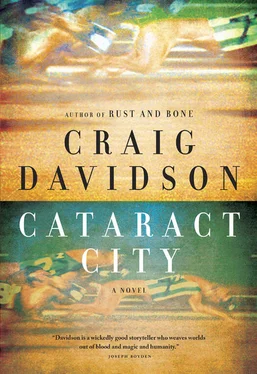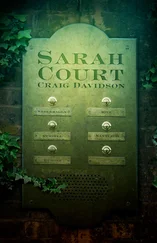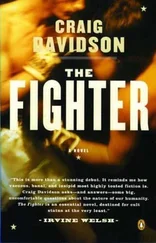After my shift that night I met Edwina in the parking lot. She was heading inside dressed in flour-caked overalls and a hairnet but she was beautiful for all that — or more beautiful because of it. The lot lights burned against the night, making golden rings around her irises. I wanted to paw at her like a lusty dog but I knew she wouldn’t stand for that. She was older — as she often reminded me — and more experienced, as she also reminded me.
“Your hands?” she asked, taking them into her own.
“They’re going to have to come off, Ed,” I told her, fake-sad. “I’m cutting them off at the wrist.”
“I’ll kiss them all better.”
There were places in Cataract City where you could buy a cold beer at seven in the morning. Two blocks north on Lindy a sleepy-eyed Mexican was still serving icy Sols out of an orange picnic cooler; he could be handing me one in five minutes and I knew just what he’d say: Wrap your leeps around a cold one, partner .
I was a working man, unlike a lot of guys my age — Owe, for one, who was off at college earning his police services diploma. So I drank, sure. Not at campus bars where girls wore perfume that smelled like a Mounds bar. At the Double Aces and Blue Lagoon, where women sat with their elbows polishing the bar alongside the guys and everyone ordered “a shot and a Hed”: a shot of rail rye and a glass of Hedley Springs, cheapest beer on tap.
A shot and a Hed, a shot and a Hed, a shot and a Hed, and you wake up feeling like you’ve been shot in the head!
Instead I drove to the house Ed and I rented on Culp Street. I caught a whiff of vanilla — I’d spilled concentrate on my hand the other week on the Nilla Wafers line and the smell had crept under my skin. I smelled like a cookie, same as every other long-time stiff at the Bisk.
Dolly met me at the door, her tail tucked between her legs. Dolly’s a greyhound. I found her in a Dumpster. I was fifteen, maybe. Sixteen?
I’d been riding my bike to the Bisk; my dad had forgotten his lunchpail. The sun was just up, the city asleep. I was coasting past the Food Terminal when a cube van went screech-assing past, laying rubber. A couple of townies who had been ridding their guts of last night’s piss-up behind the supermarket, was my guess. I dropped Dad’s lunch off and rode back, slaloming lazily between the shopping carts in the Food Terminal lot. At first I thought the yips were just gravel popping under my tires. I braked, ears straining. Were they coming from the Dumpster?
I cracked the lid and found two puppies on a flattened Del Monico tomato box. They mewled when the sunlight touched their skin. Another few hours and they would have broiled to death. They were so damn small; I remember feeling their heartbeats through their skin — or was that my own heartbeat pulsing in my hands?
I can’t tell you why, exactly, I took them to Owen’s house.
I showed up on his doorstep breathing hard from the ride. Sweat dripped off me in pints, which freaked me out because I was in Cardinal Gardens. The houses all looked pretty much the same, and they were real swish: the lawns a checkerboard green you could only get with a riding lawn mower, the bushes trimmed into leafy bells. I figured the Neighbourhood Watch was going to come along and say: Son, don’t you think you ought to bust your ass back to where you belong?
I knew where Owe lived, even though we hadn’t talked for years, since the Mahoney thing. Our dads had made that choice. But by the time I showed up at Owen’s house I had my learner’s permit in my pocket and I even knew a guy, Slick, who’d buy me a six-pack of Black Label from the beer store (at double the retailer’s suggested price). All I’m saying is, I had some freedom — I didn’t always do what Dad said anymore.
I popped the kickstand and shrugged off my backpack. The puppies were nestled on a bed of torn-up Pennysavers , the pack’s zipper halfway open so they could breathe.
Mr. Stuckey answered the door. He wore a striped shirt with Pearlite buttons, and a slice of buttered toast was clamped between his teeth.
“Good morning, Master Diggs,” he said around the toast, in an English-butler voice. “How ya been?”
“Okay, Mr. Stuckey. Owe around?”
For a sec I figured Mr. Stuckey was going to slam the door. I knew nobody would nominate me for sainthood but still, I’d never had the “bad influence” tag slapped on me. That was for guys like Sam Bovine, who’d been caught selling single pages of his father’s old fuck-book— The Well-Spanked Farm Girl —for a quarter a page. Adam Lowery had ratted Bovine out; Adam bought two pages and was pissed that all he got was four paragraphs about some chick milking cows and the autumn twilight settling across the prairies — but was it Bovine’s fault that a spank-book writer had literary dreams?
“Come on in,” Mr. Stuckey said after forever.
I waited in the hall, soaking up the air conditioning. The window unit at my house had gone balls-up that summer; we had a half-dozen fans stirring the humid air around. The backpack squirmed against my sweaty skin.
Owe came downstairs rubbing sleep from his eyes. Last I’d seen him was about a year before. My dad had been driving me home from baseball practice and we saw him with some buddies. One guy had a crewneck sweater knotted around his neck.
“Your old friend is palling around with yuppie twerps,” Dad said, frowning.
Owe went to Ridley Academy, a private school. The school — sorry, the Acchaaaadhemy ; in my head I always heard it spoken in a windbaggy British accent — had a fleet of rowing boats, called “sculls,” which the “oarsmen” raced at the Henley Regatta. I’d pictured Owe in one of those old-time rower’s getups: striped bathing suit like the ones women wore in the 1920s, a goofy straw hat perched on his head. Which I admit was a shitty thing to think. Could Owe help it if his folks could afford better?
“What’s up?” he said.
“Hey, man. Can we talk somewhere quiet?”
Owe glanced over his shoulder, where his parents sat at the kitchen table pretending to read the newspaper. “Okay … downstairs.”
The basement was unfinished. Dusty exercise equipment was heaped in a corner. Owe looked freaked. Did he think I was going to slug him, or confess I’d been having kinky dreams about him?
I shrugged the backpack off and unzipped it.
“Holy shit,” Owe said. “Where did you—?”
“In the Dumpster behind the Food Terminal. Someone … they threw them out like trash, man.”
The puppies were so small you couldn’t tell what breed they were: just wrinkly things with closed eyes. Their flopped-over ears were the size of fingernails and their paws were bright pink, like a human baby’s hands.
“What should I do with them?”
Owe said: “Keep them?”
How could my parents say no? It wasn’t like I was begging for a dog from the pet store. This was more like a humanitarian intervention.
“There’s two,” I said. “I was thinking maybe …”
“I don’t know,” Owe said. “My folks …”
“It’s okay,” said Owe’s mom, who’d crept down the stairs. “It’s the right thing to do.”
After heeling off my workboots, I walked into our unlit kitchen. Dolly padded softly behind me. I set my lunchpail on the counter — it was my dad’s old pail, covered in Chiquita Banana stickers — opened the fridge, shook the milk carton. Only a few mouthfuls left; I gulped straight from the carton, bachelor-style. Then I tore rags of dark meat off a rotisserie chicken. Dolly ate them in that weird, gluttonous way dogs do: snapping her head back and flinging the meat down her throat.
“You hog,” I said softly. She watched me, eyes shining in the fridge-light.
Читать дальше












